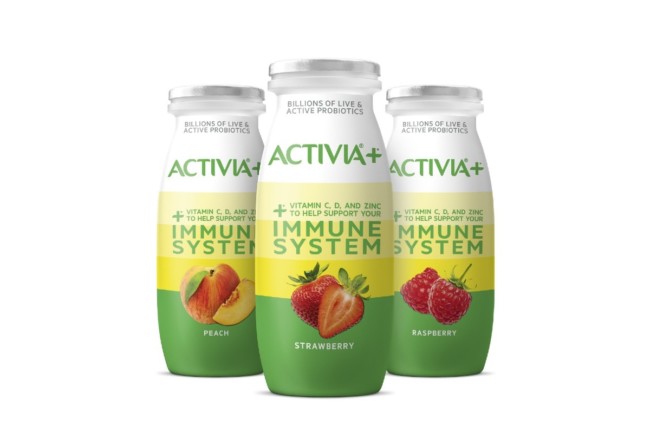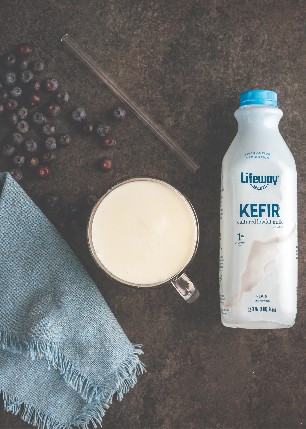Gone is yesterday’s one-size-fits-all strategy for health and eating.
“Today’s consumers seek customized approaches to support their overall health and well-being, with products made to support their unique needs and fit seamlessly into their daily routines,” said Vaughn DuBow, global director of marketing – microbiome solutions, ADM, Chicago. “This is thrusting the gut microbiome into the spotlight, as consumers recognize the role their gut and digestive health play in their physical and emotional well-being. In fact, 76% of global consumers recognize a link between their digestive and overall health.”
Dairy and alternative dairy brands that leverage this increasing interest in gut health and bring innovative offerings targeting gut support to the market will find success with today’s consumers, DuBow said.
“Many consumers already perceive a strong connection between gut health and certain dairy products, such as yogurt and kefir,” he said. “More offerings across the dairy category that incorporate microbiome-supporting solutions, such as prebiotics, probiotics and postbiotics, can help check the boxes for both personalized wellness support, as well as provide excellent sensory experiences. We see this emerging, for example, with ready-to-drink (RTD) dairy-based shakes containing postbiotics, as well as fiber-forward frozen treats.”
As consumers demand more support for their gut health, the dairy and alternative dairy industry is evolving to respond.
DuBow anticipates further research on prebiotic fiber to highlight its ability to bolster innovation in the dairy and alternative dairy spaces, respectively. In the realm of probiotics, accelerated research into strain-specific benefits helps address consumers’ increased demand for personalized solutions.
In the dairy space, DuBow said, postbiotics are critical to achieving both functional and delicious offerings.
“Containing nonviable microorganisms, postbiotics can withstand various harsh processing conditions typically found in the development of dairy products, such as pasteurization and high heat,” he said.
Dairy’s role in wellness
The traditional role that dairy plays in supporting gut health is through cultured dairy products. Dairy products also contribute many macro and micronutrients that contribute to health and wellness, according to KJ Burrington, vice president of technical development for the Elmhurst, Ill.-based American Dairy Products Institute (ADPI).
“The live and active cultures in [cultured dairy] products can help us to digest the lactose that we ingest with the product,” Burrington said. “They also contribute fermentation byproducts, such as bioactive peptides, in aged cheese that support good health.”
For products with added probiotics, dairy can be a great delivery system to provide good bacteria that will help support a healthy gut and immune system.
“These products have been a part of our diets for centuries, but mainstream consumers are just beginning to understand the benefits to gut health and wellness now through more media presence,” she said.
Milk contains 13 essential nutrients: protein, calcium, Vitamin D, phosphorous, Vitamin A, riboflavin, potassium, pantothenic acid, niacin, Vitamin B12, zinc, selenium and iodine. Dry milk ingredients, such as nonfat dry milk and whole milk powder, also have the same essential nutrients, other than Vitamins A and D, because nonfat dry milk is not fortified like skim milk would be, according to Burrington.
“You would think that by now we must know everything about milk and dairy products, but the truth is we are discovering new functional components every day through continued research.”
ADPI launched “The Strong Inside” campaign, developed by its members, out of a desire to build awareness and improve the perception of proteins from milk with consumers.
“As most dairy marketing is focused on fluid milk, the campaign is unique in that it focuses on utilizing the proteins from milk in everyday life for different lifestyles, such as being active, being healthy, or for weight management,” said Tara Anderson, ADPI vice president of marketing and events. “The word whey remains unfamiliar with consumers, and the goal is to educate that proteins from milk are complete proteins, containing all essential nutrients, as well as a high-quality protein at a lower cost point for purchasing consumers.”
The campaign has primarily been a digital marketing effort, Anderson said, to engage consumers in social media spaces by utilizing influencers from the food and fitness communities, as well as driving traffic to the campaign’s website with digital marketing ads on Google and other well-traveled spaces online.
Proteins from milk, Anderson said, are nature’s complete protein — naturally derived, readily available, sustainable and powerfully potent.
Beyond nutrition, there is an increasing amount of data and information to demonstrate a bioactive role for dairy components in adults. Milk-derived bioactive peptides (BAPs) possess several potential attributes in terms of therapeutic capacity and nutritional value.
“As we discover more about the bioactive properties of milk and dairy products, I think we will discover that they are uniquely designed to help support gut health and overall health for all age groups,” Burrington said.
 Photo: Danone North America
Photo: Danone North AmericaFermented phenomenon
Danone was founded more than 100 years ago on a breakthrough concept at the time: that fermented foods and the bacteria they contained could help bring health to all.
“Studies show that our bodies host trillions of microorganisms which are vital to our well-being and may influence how we sleep and even our energy levels,” said Kristie Leigh, director of health and scientific affairs at Danone North America, White Plains, NY. “Dairy products like yogurt are often effective when it comes to delivering probiotics, allowing higher levels of probiotics to reach the intestine. What’s more, they often contain essential nutrients and work to support digestion by helping to promote gut health as part of one’s wellness routine.”
Danone places the gut and microbiome at the core of its health strategy to deliver the company’s mission of “bringing health through food to as many people as possible” with brands such as Activia taking center stage.
Activia is a probiotics pioneer, leading the way in probiotics research for 20 years as the No. 1 gut health brand in the US and No. 1 doctor recommended probiotic food and beverage brand, according to Leigh. When Activia launched in 2006, the majority of consumers had not even heard of probiotics, but today that has changed. In a recent study, 75% of respondents noted they were familiar with probiotics. As a result, Danone has seen increased consumer focus on gut health, ultimately leading to increased demand for these products and the continued growth of Activia.
While probiotics are a primary focus, Leigh said, Activia yogurts contain essential nutrients like calcium and vitamin D, are available in various flavors and formats, and offer a convenient and enjoyable way to incorporate essential nutrients as part of one’s wellness routine. Activia also has prebiotic fiber added to some of its products.
“Prebiotic fiber is food for the good bacteria in your gut, helping to nourish your gut microbiome and help support gut health,” she said. “More broadly, our portfolio is designed with our mission to bring health through food to as many people as possible – with 70% of our products categorized as nutrient dense and a house of brands that includes products across the wellness spectrum from our lower sugar Two Good yogurt to our protein-packed Oikos products.”
 Photo: Lifeway
Photo: Lifeway Probiotic powerhouse
Lifeway Foods, Morton Grove, Ill., is a health food company that was founded in 1986. It is a leading US supplier of kefir and fermented probiotic products to support the microbiome. Its products include a variety of low fat, whole milk and organic kefir, as well as farmer cheese, a dry curd fresh cheese made from kefir.
“All Lifeway products are fermented dairy, which provides gut-nourishing, 12 live and active probiotic cultures (25-30 billion colony forming units) per serving and all the nutrient-rich benefits that dairy has to offer,” said Caroline Margolis, RDN, registered dietician at Lifeway Foods.
Research has found that consuming a variety of probiotic foods, such as kefir, may help promote a healthy gut microbiome to support digestive health.
“The nutrients found in kefir are essential for a healthy body, including building and maintaining muscle, energy and a healthy weight,” Margolis said. “An 8-ounce serving of kefir is excellent source of vitamin D, riboflavin, calcium and phosphorus, and a good source of protein, vitamin A, vitamin B12, potassium and selenium. The probiotics in Lifeway products may help maintain a healthy and balanced gut. This in turn supports our immune system, digestive health and our mood. Research is also finding that a healthy gut supported by a healthy diet reduces our risk of various diseases, including psychological and neurological diseases, autoimmune diseases, cardiovascular disease and unhealthy weight.”
In general, Margolis said, dairy provides a variety of nutrients important for everyday health, including heart health, given its starring role in the Dietary Approaches to Stop Hypertension diet (DASH). The diet was first introduced in 1997 and was promoted by the National Institute of Health’s National Heart, Lung, and Blood Institute (NHBLI) for reducing blood pressure.
The food industry has evolved in the past five years, Margolis said, especially with probiotics, microbiome and immune health.
“Consumers value fermented dairy products, such as kefir and yogurt, because not only do they provide a source of probiotics, but they offer more nutrients than other beverages like kombucha or probiotic soda,” she said. “Most fermented dairy products are good to excellent sources of protein, which is important for satiety, and excellent sources of calcium for bone health. In addition, kefir is an excellent source of vitamin D, a nutrient many Americans needs more intake of.”
Gut health
In the realm of dairy products, Leigh said Danone has noticed a rising trend in consumers valuing gut health and nutrition.
“The conversation around gut health has recently exploded, with hashtags like #GutTok reaching more than 983 million views on TikTok,” she said. “Consumers, particularly women, are seeking dairy options that contribute to a healthy gut. We’re proud to see consumers embracing this topic through candid conversations, signifying a shared journey toward better gut health.”
Additionally, Leigh said Danone’s mission and portfolio seamlessly address consumers’ heightened emphasis on health, wellness and nutrition.
“Consumers are increasingly prioritizing nutrition and are beginning to understand how food impacts overall well-being,” she said. “Notably, we’ve seen consumers are looking to lead a healthier lifestyle than they were pre-pandemic.”
In the company’s State of Nutrition Equality Study, which was released in June, findings underscore how consumers are increasingly valuing nutrition, and that dairy plays an important role.
“Across all survey respondents, consumers ranked yogurt/yogurt beverages as a top food that they consider nutritious,” Leigh said. “We are continuing to stay ahead of the latest trends in dairy so we can continue to meet consumer needs.”

